The downside to writing about Kickstarter projects is that sometimes there are games that I really wish you could just go out and buy right now because I’m having so much fun playing the prototype versions. Eggs & Empires is one such game, and in this case I even had to wait for the Kickstarter launch because I’d actually gotten to try it out well in advance. Eggs & Empires is designed by Ben Pinchback and Matt Riddle, also the designers of Fleet, and it just launched on Kickstarter today.
Here’s the story: you’re all trying to collect valuable dragon eggs from Ridback Mountain by sending your adventurers out to get them. However, some of the dragon eggs explode, so you’ll want to avoid those … or pawn them off on somebody else if possible. Whoever manages to collect the most (unexploding) eggs wins fame and fortune. Or baby dragons.
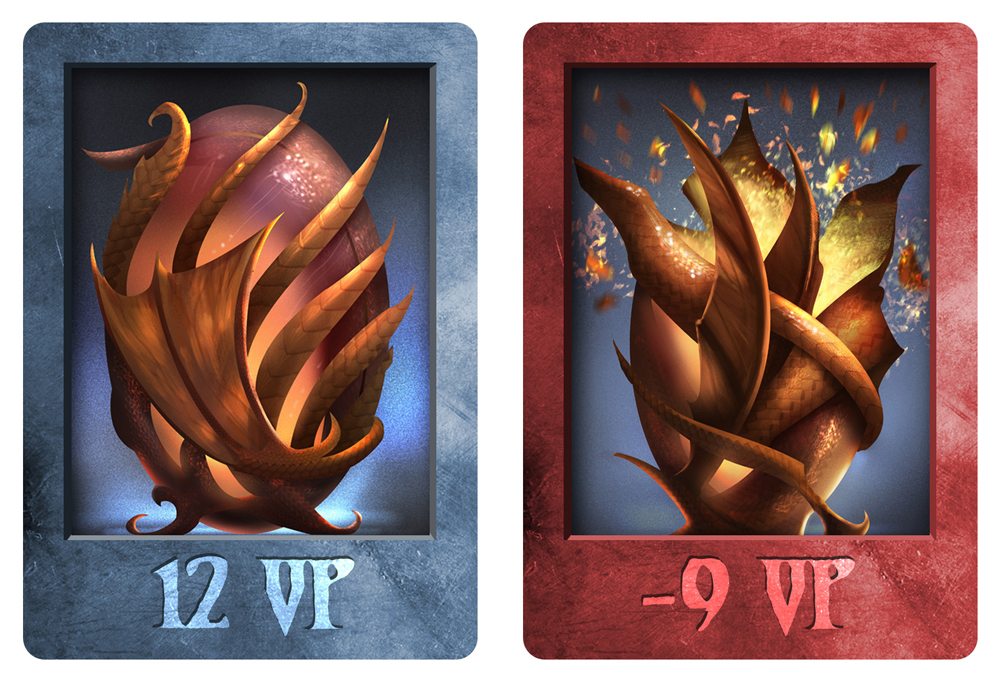
At a glance: Eggs & Empires is for 2 to 6 players, ages 8 and up, and takes about 20 minutes to play. The rules are easy enough to understand that I’ve played with kids even younger than 8, though some had trouble picking up the strategy and nuances. The pledge level on Kickstarter for a copy of the game is $16.
Components:
- 102 cards: 60 player cards (10 per player), 42 Egg cards
- 1 Egg Tie Breaker Marker
- 13 Egg Chits for Pub/Con scoring
The box will be 5.375″ by 4.25″ by 1.0″, which is delightfully small. I love games that are compact, and Eggs & Empires will definitely be one that I can take with me when traveling.
The prototype version I played didn’t have final art and the tie breaker marker and egg chits were just a generic wooden pawn and plastic chips. They do have finished artwork by Cristian Chihaia now, and it looks pretty impressive, particularly compared to the samples you’ll see in my photos later.
How to play
The object of the game is to score the most points (by collecting good eggs) in three rounds of play. Pub/Convention scoring is slightly different, but the goal is the same: collect good eggs, avoid bad eggs.
To set up, each player takes a set of 10 cards, shuffles them, and then draws a hand of three cards. One player takes the tie breaker marker. The egg cards are shuffled and a certain number (depending on player number) are turned face up in the center of the table. Typically there are fewer eggs available than there are players.
Each player picks a card from their hand to play and places it face down. Once everyone has chosen a card, they’re all revealed simultaneously. The highest number takes an egg first, then the second highest number, and so on, until you run out of eggs or players.
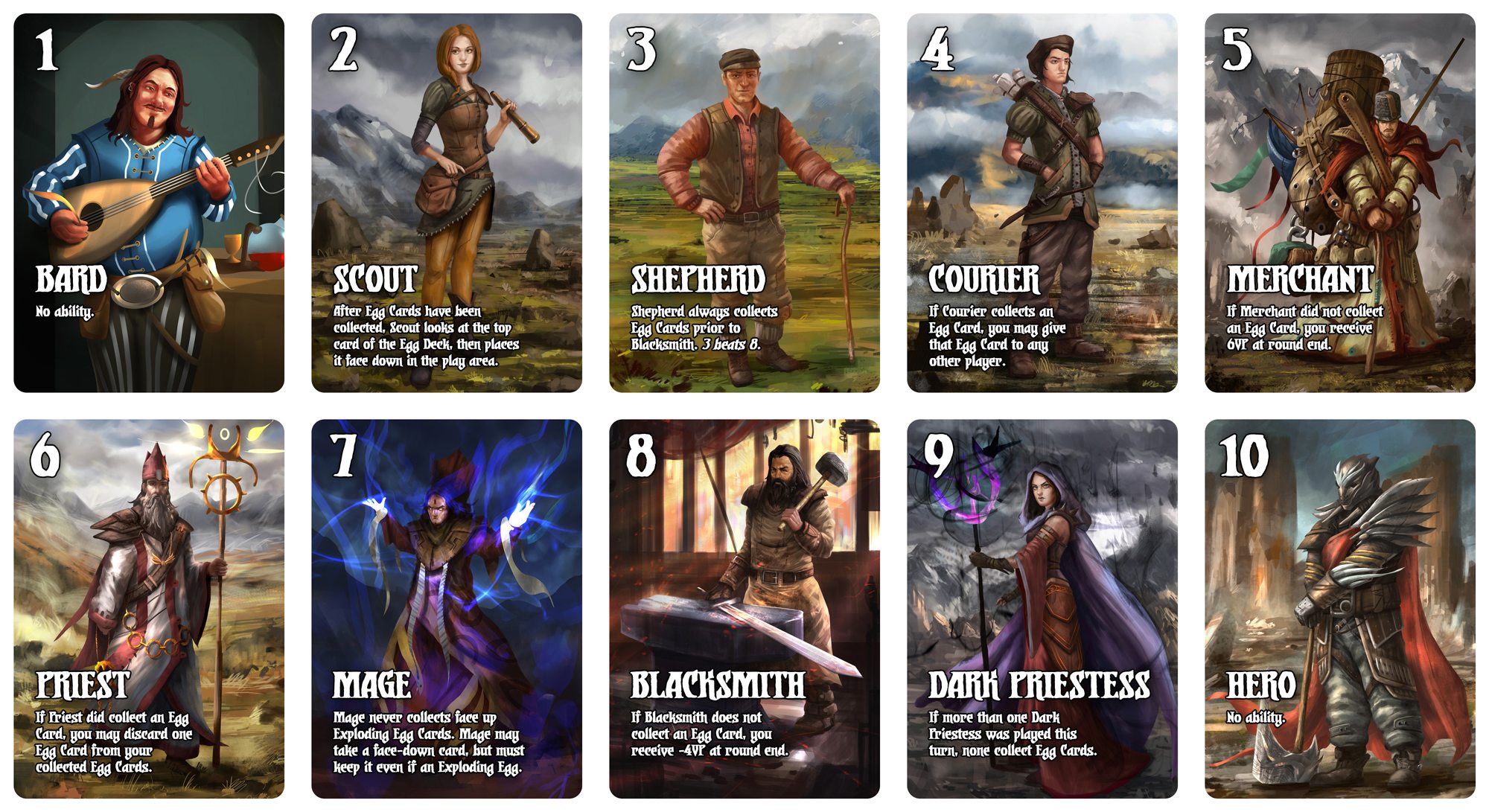
Of course, it’s not quite that simple. Each card has its own unique qualities, too. Here’s the list:
- Bard – no special ability
- Scout – get to peek at an egg card and add it face-down for the next round
- Shepherd – jumps ahead of the Blacksmith, if any
- Courier – may give the egg he won to another player
- Merchant – worth 6 points if he doesn’t get an egg
- Priest – may discard any egg if he wins an egg
- Mage – doesn’t have to take face-up exploding eggs
- Blacksmith – player loses 4 points if Blacksmith doesn’t win an egg
- Dark Priestess – is canceled if another player also plays Dark Priestess
- Hero – no special ability
There are some more specific details about the way these cards interact, but that’s the basic idea. If there’s a tie for highest, then you start with the player holding the tie breaker marker and go clockwise. Every time the marker is used to break a tie, the marker is passed clockwise as well. (Note: if you’ve been playing the prototype version with me, you might notice that the Priest and Merchant have been swapped, but the powers are still tied to the same ranks, so gameplay actually hasn’t changed.)
If it’s your turn to collect an egg, then you must collect one, even if it’s an exploding one (except for the Mage, who knows better). After the eggs are resolved, then everyone draws back up to three and more eggs are laid out. The round lasts nine turns, so you’ll end up playing all but one of your cards.

Count up scores, shuffle all the eggs back together, get all your own cards back, and play two more rounds. At the end of the third round, the player with the highest score wins!
For pub/con scoring, you can use the egg chits instead. The highest score in a round takes an egg chit, and the goal is to win a certain number of chits, depending on the number of players.
The Verdict
Okay, the first time I read over the rules, it didn’t seem like anything really exciting. Once I actually sat down and started playing, though, it was terrific. The basic rules are simple enough that you can explain them quickly: pick cards, reveal, highest rank gets eggs first. The two twists that really make the game fun are the card abilities and the exploding eggs.
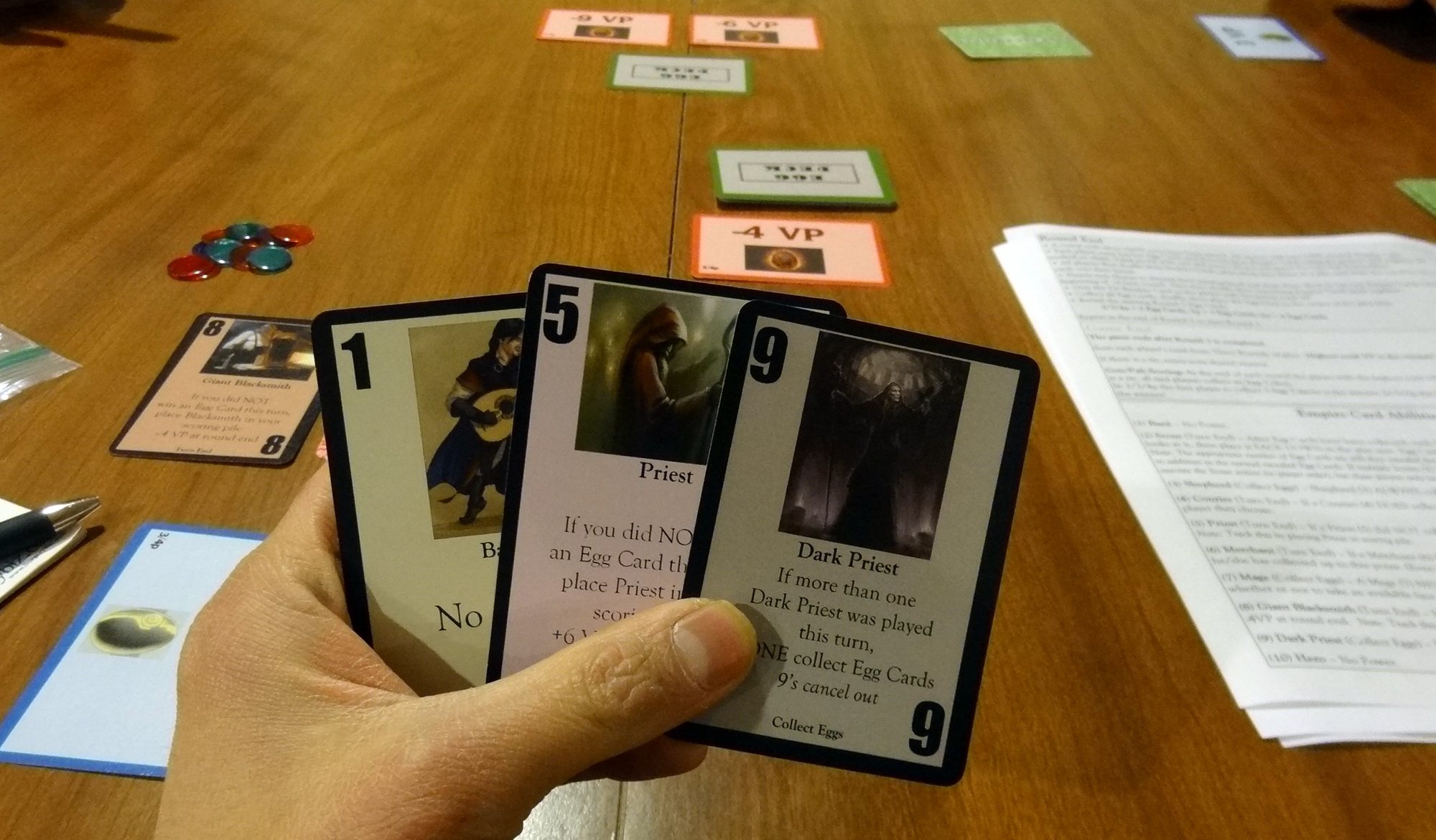
The cards are very well balanced. The higher numbers tend to have penalties—Dark Priestesses (9) cancel each other out, so when there are good eggs available you’re never sure whether you should use her, at the risk of not getting anything. The Blacksmith (8) will cost you points if you don’t win an egg, so although he’s a high number, you may end up getting sniped by that sneaky Shepherd. The lower numbers have good bonuses: the Scout (2) is generally unlikely to win an egg, but the next round there will be an extra egg—and only you know what it is. The Courier (4) and Priest (6) are both great ways to get rid of exploding eggs—and it’s particularly satisfying to deliver an exploding egg to another player who’s in the lead.
The exploding eggs are the other thing that make the game so challenging. The range of scores on all the eggs goes from -10 to 15 points, so there’s a big spread. When there are both good and bad eggs on the table, you have to be very careful about what you play. Pick first, and you’ll get to take some points. But if you play a high card and get second or third place, you’ll be forced to take an exploding egg instead. It’s all about predicting what your opponents might play, and also keeping an eye on where that tie breaker marker is.
I took the Eggs & Empires prototype with me to GameStorm and played it a few times there with both adults and kids, and then took it on our spring break camping trip and played it with my family. It’s been a hit with just about everyone, and it even works to mix adults and kids. Kids may have a harder time predicting what other players will do, but their own unpredictability means that you have to adjust your strategy as well. Depending on your kids, it’s like throwing a wildcard into the game.
I also really appreciate having a game that goes up to 6 players but stays quick and light, and is very portable. Even with 6, the game doesn’t bog down, and with that many people you do get a lot of tie-breakers, which can be exciting. The two-player game is actually a variant—you each use two decks of cards, and play two cards each turn. I thought it would feel tacked on, but it actually works really well. It has a different feel to it, but getting to play two cards gives each player a little more information about potential outcomes, and also lets you use combinations that may work well together.
Having played a few times, I think I prefer the pub/con scoring rather than straight victory points, though there are advantages to each. Regular scoring does require something to track points, but I found that the range of scores can vary wildly because of the exploding eggs. With the pub/con scoring, however, all you need to do is get more points in a round—whether that’s by 1 point or 15 doesn’t matter—and you get an egg chit. It seems to balance out the game a little, and also doesn’t require additional scorekeeping.
In short, Eggs & Empires is a definite winner in my book. The only complaint I have about it is that it’s not available right now, so you’ll have to wait until the end of the year to get your finished copy. With Gryphon Games behind the project, I feel pretty confident that it will deliver on time and look great when it’s done. Visit the Kickstarter page to check it out and pledge for a copy!
Disclosure: GeekDad received a demo prototype of this game.
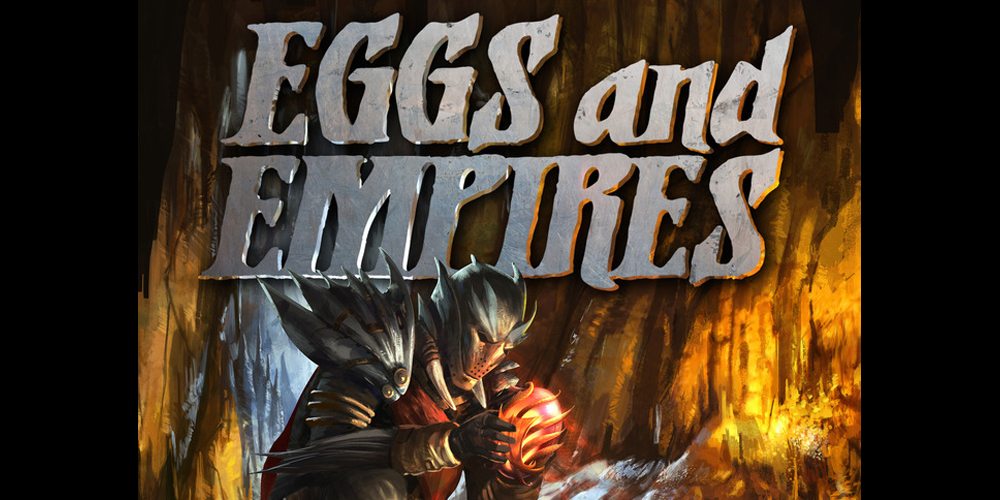
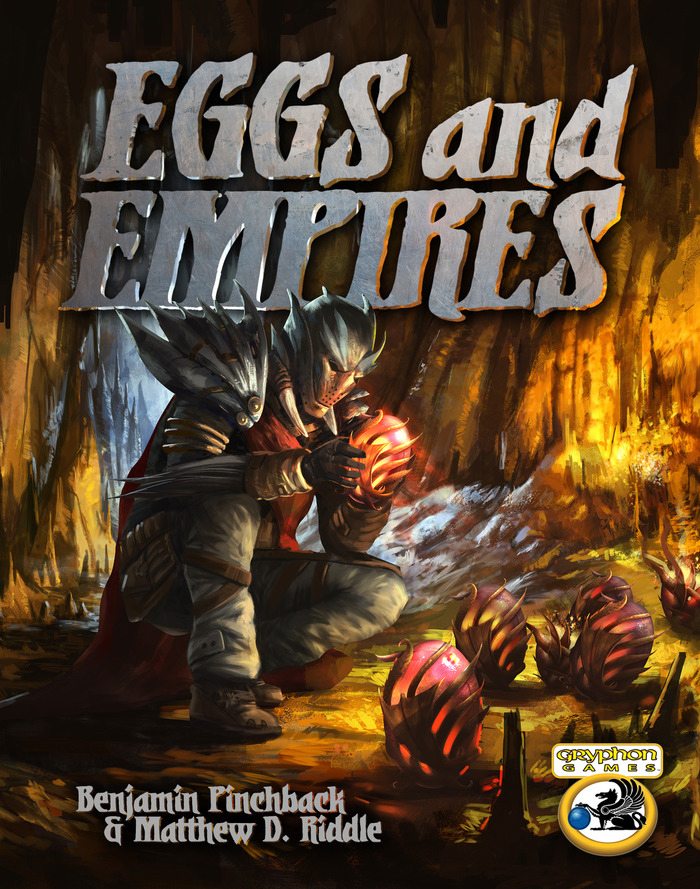




Woot!!! Thanks Jonathan!